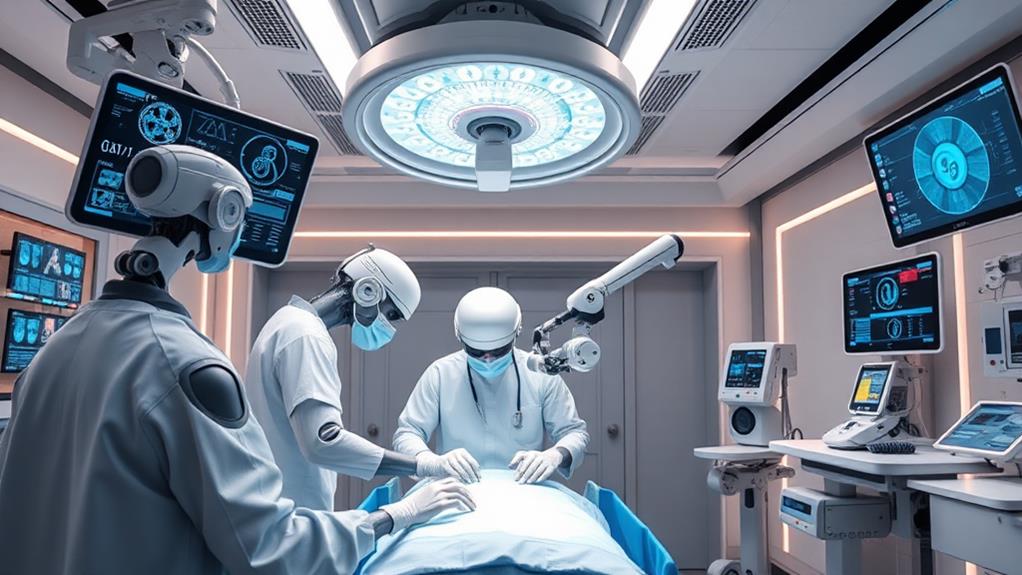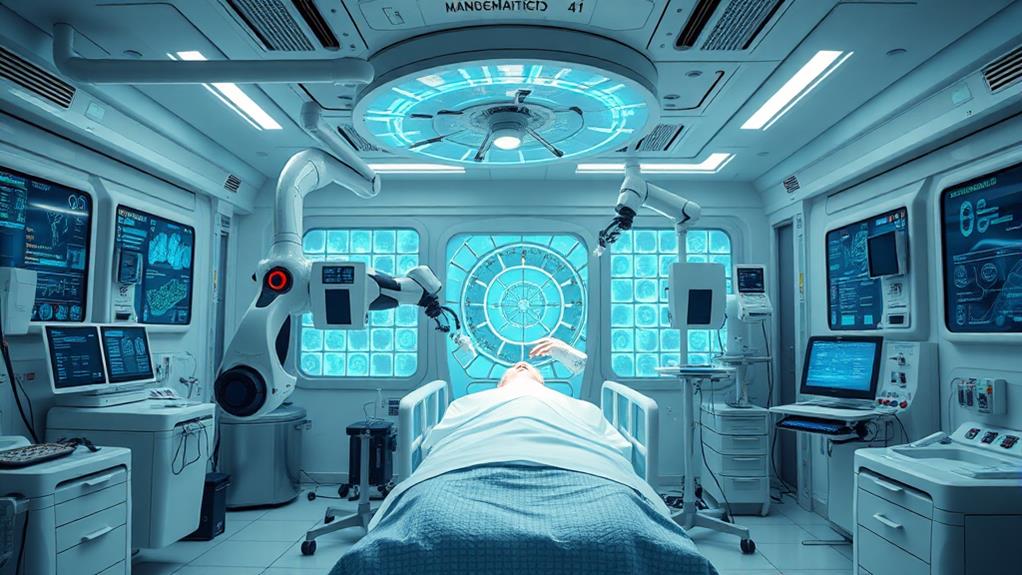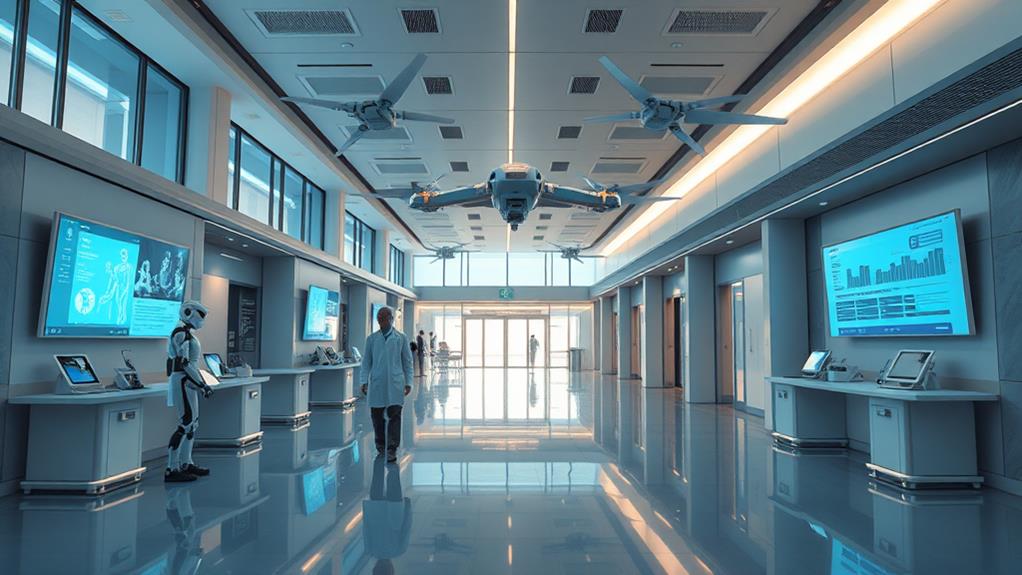Automation is revolutionizing healthcare by driving efficiency and advancing patient care. By automating routine tasks such as scheduling and follow-ups, healthcare professionals can concentrate on delivering exceptional patient care. Technologies like AI increase productivity by up to 40%, while predictive modeling optimizes treatment. The healthcare automation market, valued at $35.2 billion, reflects vast growth potential fueled by innovation and consumer demand. As regulatory support and technological advancements align, a new era of patient-centric and seamless care emerges, promising significant operational efficiencies. Explore how these changes create more agile and responsive healthcare systems, transforming the landscape of patient care.
Key Takeaways
- Automation enhances patient engagement by streamlining routine tasks, allowing healthcare professionals to focus on quality care.
- AI tools improve productivity by automating interactions, increasing patient satisfaction and operational efficiency.
- Workflow optimization through automation refines scheduling, admissions, discharges, and billing processes.
- Clinical robotics perform routine tasks with precision, freeing healthcare teams from administrative burdens.
- Predictive modeling and machine learning enhance diagnostic accuracy and optimize treatment paths.
Understanding Healthcare Automation

Understanding healthcare automation is essential in today's rapidly evolving medical landscape, where technology is not just an accessory but a fundamental driver of change. Embracing this shift empowers healthcare providers to enhance patient engagement and streamline workflow efficiency.
By automating routine tasks such as patient registration and treatment follow-ups, healthcare facilities can liberate their teams from administrative burdens, allowing professionals to focus on delivering quality care. This is similar to how AI tools automate repetitive tasks, increasing productivity by up to 40% and freeing up resources for more critical work.
This transformation is not merely a trend but a necessity, fueling a dynamic environment where patient satisfaction and operational excellence go hand in hand. The healthcare automation market, valued at $35.2 billion, is set to skyrocket, underscoring the critical importance of understanding and leveraging these technologies to navigate the future of healthcare effectively.
Growth in Automated Healthcare
The rapid acceleration of automated healthcare is reshaping the industry landscape with unprecedented vigor. As automation permeates healthcare, it fuels a revolution marked by enhanced patient engagement and operational efficiency. AI-driven solutions, such as predictive analytics, are enhancing decision-making and personalized marketing, improving patient outcomes and satisfaction.
This transformation is driven by several key factors:
- Investment Surge: Capital influx into healthcare technology is unprecedented, fueling innovation.
- Regulatory Support: Favorable policies are accelerating the adoption of automated solutions.
- Consumer Demand: Patients yearn for more control, demanding seamless and efficient care.
- Technological Advancements: Cutting-edge technologies are constantly evolving, pushing boundaries.
These dynamics are not just trends but a bold shift towards a liberated healthcare ecosystem.
Automation empowers both patients and providers, fostering an era where efficiency and engagement are no longer optional but fundamental.
Key Automation Mechanisms

In healthcare's dynamic landscape, automation mechanisms are the backbone driving transformative change. From streamlining workflow processes to enhancing clinical operations, automation is at the forefront of revolutionizing traditional healthcare delivery. By integrating smart automation in business, healthcare organizations are able to reduce administrative burdens, allowing medical professionals to focus more on patient care. Moreover, automation paves the way for predictive analytics and data-driven decision-making, further improving patient outcomes and operational efficiency. This technological advancement is setting a new standard for how healthcare systems function in a fast-evolving digital world.
Central to this transformation is workflow optimization, which involves refining scheduling, admissions, discharges, and billing to achieve unmatched efficiency. This leads to liberated healthcare professionals, allowing them to focus on patient care rather than administrative burdens.
Additionally, clinical robotics is reshaping the domain of clinical automation. These programmable entities perform routine tasks, from diagnostics to medication administration, with unparalleled precision and consistency.
Through these mechanisms, healthcare systems become more agile, responsive, and proactive, ensuring that both patients and providers experience a seamless, future-focused healthcare environment.
AI's Impact on Automation
Automation mechanisms lay the groundwork for a revolution in healthcare, but it is AI that propels these advancements to new heights.
AI advancements in healthcare automation release unparalleled efficiency and precision, transforming patient care dynamics. Here's how AI's impact unfolds:
- Predictive Modeling: With AI, predictive modeling becomes a powerful tool, anticipating patient needs and optimizing treatment paths.
- Enhanced Diagnostic Accuracy: Machine learning algorithms rapidly identify anomalies, reducing diagnostic errors and enhancing patient outcomes.
- Resource Allocation: AI streamlines resource allocation, ensuring healthcare facilities operate at peak efficiency.
- Patient Engagement: Automating routine interactions, AI enhances patient satisfaction through timely communication and personalized care.
In embracing these innovations, healthcare professionals gain the freedom to focus on what truly matters—delivering exceptional care.
Future Prospects of Automation

Healthcare's future will be indelibly shaped by the continuous evolution of automation technologies. As these innovations become more sophisticated, they promise to redefine the landscape of patient care and operational efficiency. Entrepreneurs in the healthcare sector will drive this transformation, steering through ethical considerations and guarding patient privacy with innovation as the compass. The future is ripe with potential, as automation empowers healthcare professionals with unprecedented freedom to deliver personalized care.
| Aspect | Impact |
|---|---|
| Ethical Considerations | Guarantees responsible automation deployment |
| Patient Privacy | Critical in maintaining trust |
| Operational Efficiency | Reduces costs and enhances workflows |
| Personalized Care | Leverages data for tailored treatments |
Automation will continue to expand, fostering a revolution in patient-centric care, where technology aligns with human values to reveal new horizons.
Frequently Asked Questions
How Does Healthcare Automation Impact Patient Privacy and Data Security?
Healthcare automation greatly impacts patient privacy and data security, necessitating robust data encryption and consent management systems. As automation streamlines processes, safeguarding sensitive information becomes paramount.
Data encryption guarantees secure transmission and storage, while consent management empowers patients, granting them control over their data. This entrepreneurial approach not only protects privacy but also aligns with an audience that values autonomy, fostering a secure, patient-centered healthcare environment.
What Are the Ethical Considerations of Automation in Healthcare?
The ethical considerations of automation in healthcare are multifaceted.
Algorithmic bias poses a threat to equitable treatment, potentially skewing patient outcomes.
Informed consent becomes critical as patients must understand AI-driven decisions impacting their care.
Transparency and accountability in algorithm design are paramount.
Automation must empower patients, ensuring freedom of choice without compromising ethical standards.
The future of healthcare hinges on balancing innovation with moral responsibility.
How Is the Workforce Affected by Increased Healthcare Automation?
The rise of healthcare automation greatly impacts the workforce, primarily through job displacement and the need for skill adaptation.
As automation takes over routine tasks, some roles become obsolete, necessitating a shift in workforce dynamics.
Professionals must embrace a proactive approach, acquiring new skills to thrive in this evolving landscape.
The demand for tech-savvy individuals increases, offering opportunities for those willing to adapt and excel, fostering innovation and freedom in healthcare careers.
What Are the Challenges in Implementing Automation in Rural Healthcare Settings?
Implementing automation in rural healthcare settings faces significant technology barriers and infrastructure disparities.
Resource limitations hinder access to necessary tools, while training challenges impede the workforce's ability to adapt.
Overcoming these obstacles demands an entrepreneurial mindset focused on innovation and resilience.
Bridging the digital divide is essential, empowering rural communities with the freedom to embrace advanced healthcare solutions and improve outcomes through strategic investments and partnerships.
How Do Patients Perceive the Shift Towards Automated Healthcare Systems?
Patients' experiences with the shift towards automated healthcare systems are increasingly positive, reflecting growing technology acceptance. This transformation empowers individuals by offering greater autonomy over their healthcare journey.
The integration of AI and robotics enhances efficiency and personalization, making healthcare more accessible and responsive.
However, the challenge lies in ensuring that the adoption of technology aligns with patient trust and understanding, fostering an environment that champions innovation and freedom in healthcare delivery.
Conclusion
Healthcare automation is redefining the medical landscape by integrating AI and robotics to enhance operational efficiency and patient care. The market's growth from $35.2 billion to a projected $90.88 billion by 2032 highlights its transformative potential. This shift demands that healthcare professionals adapt to these advancements, ensuring more accurate diagnostics, efficient workflows, and personalized care. Embracing automation is not optional but essential for reducing costs and improving health outcomes, solidifying its role as the future of healthcare delivery.






